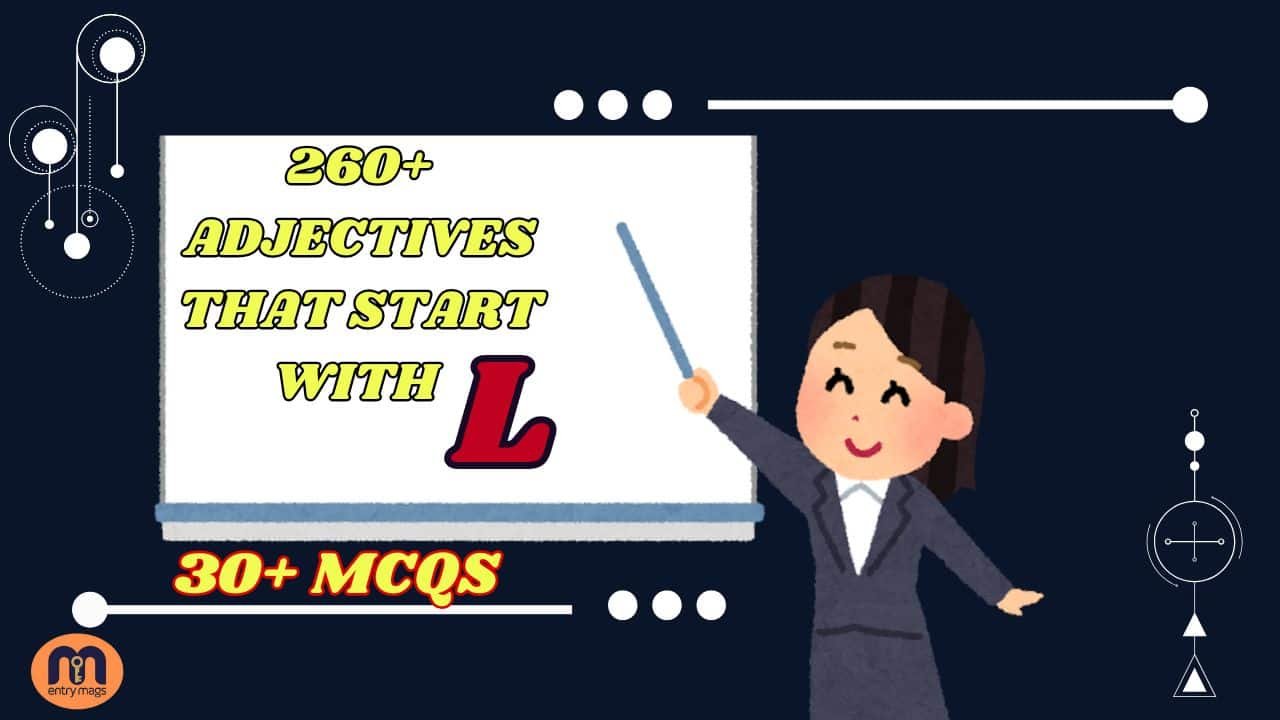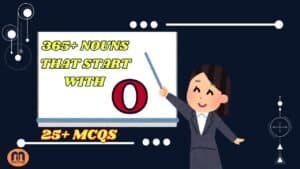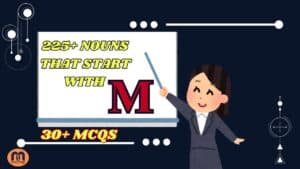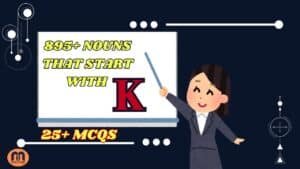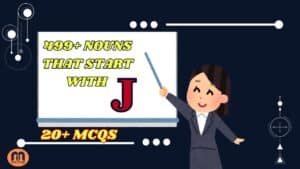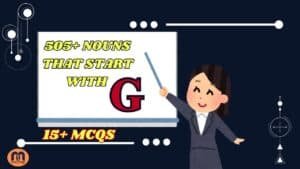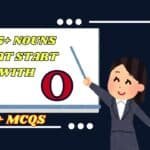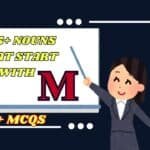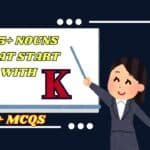Adjectives That Start With L: Adjectives are the unsung heroes of our language. They add color, detail, and nuance to the words we speak and write.
Without them, our language would feel flat and devoid of personality. Whether you’re an aspiring writer, a student, or simply someone who loves the power of words, expanding your adjective vocabulary can significantly enhance your communication skills.
In this article, we’ll explore over 260+ adjectives that start with the letter L, categorized for easy reference. This list will not only broaden your vocabulary but also allow you to express yourself more vividly and precisely.
Why Expanding Your Adjective Vocabulary Matters
Imagine you’re telling a friend about your favorite vacation. Instead of saying, “It was a nice trip,” you could paint a much richer picture: “It was a luxurious, peaceful getaway filled with breathtaking views and lively activities.”
The adjectives here luxurious, peaceful, breathtaking, and lively turn a simple statement into an engaging narrative. This is the power of adjectives: they transform basic descriptions into something more engaging and memorable.
Now, let’s dive into the expansive world of L adjectives that will help you add vivid descriptions to your conversations and writings.
Positive Adjectives That Start with L
Positive adjectives can elevate your communication, making it more uplifting, enthusiastic, and inspiring. Whether you’re complimenting someone, describing a positive experience, or conveying a sense of hope, these adjectives will help you choose the perfect words.
- Luminous: bright or shining
- Lively: full of life and energy
- Lovely: delightful and pleasing
- Loyal: showing firm allegiance or support
- Lush: rich and abundant, often used to describe nature
- Lucid: clear, easily understood
- Lustrous: shiny and reflective, often used to describe hair or surfaces
- Liberal: generous or open-minded
- Lavish: extravagant and luxurious
- Lively: animated, spirited, and full of energy
- Luminous: glowing or radiant, especially in a dark setting
- Laudable: deserving praise and recognition
- Lusty: full of strength and vitality
- Luscious: pleasing to taste or smell, rich and sweet
- Loving: affectionate and warm-hearted
- Leaderlike: demonstrating leadership qualities
Examples in Context:
- The luminous moonlight illuminated the forest path, creating a serene atmosphere.
- She was a lively person, always brightening up any room with her enthusiasm.
Negative Adjectives That Start with L
While positive adjectives are essential for uplifting communication, negative adjectives are equally important. They allow you to express dissatisfaction, disappointment, or any adverse traits you may encounter in people, situations, or objects.
- Lackluster: dull, uninspiring
- Languid: weak or faint from fatigue or illness
- Lopsided: uneven, not balanced
- Lethargic: sluggish, lacking energy or motivation
- Livid: extremely angry or furious
- Lonely: feeling isolated or abandoned
- Lousy: of poor quality, disappointing
- Lackadaisical: showing a lack of enthusiasm or interest
- Lopsided: unbalanced or uneven in appearance
- Languishing: wasting away from neglect or hardship
- Lackluster: not shining or glowing, dull
Examples in Context:
- The languid performance left the audience uninterested and disappointed.
- The movie received lousy reviews, with critics calling it predictable and unoriginal.
Descriptive Adjectives That Start with L
Descriptive adjectives are essential tools for painting a clear picture in the reader’s or listener’s mind. They help you convey the appearance, texture, or condition of an object, person, or scene.
- Large: of considerable size or extent
- Little: small in size or amount
- Long: extending a great distance or duration
- Loose: not tight or firmly held
- Low: not high, located near the ground
- Lustrous: shining, glossy
- Lanky: tall and thin, often awkwardly so
- Lopsided: uneven or asymmetrical
- Lush: full of plant life or vegetation, often used for landscapes
Examples in Context:
- The lanky athlete stood out on the court with his tall, slender frame.
- The garden was incredibly lush, with vibrant flowers and thick, green grass.
Emotional Adjectives That Start with L
Emotions drive our connections and responses. Adjectives that describe emotions help express feelings more deeply, whether it’s joy, sadness, anger, or love.
- Livid: extremely angry
- Lonely: feeling abandoned or isolated
- Loverlike: full of affection or tenderness
- Lustful: full of intense sexual desire
- Listless: lacking energy or enthusiasm
- Lachrymose: tearful or weepy
- Lighthearted: cheerful, carefree
- Lamentable: deserving to be mourned or regretted
Examples in Context:
- He felt lonely in the bustling city, far from family and friends.
- The lighthearted atmosphere at the party made everyone feel welcome and relaxed.
Interesting and Uncommon Adjectives Starting with L
Expanding your vocabulary also means exploring adjectives that are a little more unusual, but just as valuable. These uncommon adjectives can add flair and uniqueness to your descriptions.
- Languorous: characterized by a dreamy, lazy mood
- Lachrymatory: causing tears or crying
- Lethiferous: deadly or harmful
- Luciferous: bringing light or illumination, often metaphorically
- Luminous: glowing with light, radiating
- Lunary: relating to or resembling the moon
- Lubricious: oily, slippery, or morally lascivious
Examples in Context:
- The languorous afternoon drifted by slowly, as everyone enjoyed the calm of the countryside.
- The scientist’s luciferous discovery illuminated an entire field of research.
Adjectives for Size and Measurement
These adjectives describe dimensions, amounts, and scales, making them useful for comparing or outlining the size of objects, people, or abstract concepts.
- Large: of considerable size or extent.
- Lilliputian: extremely small; miniature.
- Limited: restricted in range or extent.
- Long: having great length or duration.
- Long-lasting: enduring for a long period.
- Lowly: humble in position or rank.
- Lumbering: moving slowly and awkwardly.
- Lofty: elevated in height or spirit.
- Lopsided: uneven, asymmetrical.
- Languorous: lazy, sluggish, typically after exertion.
- Lumbering: moving in a slow and heavy manner.
- Light: not heavy in weight.
- Little: small in size, amount, or degree.
- Lenticular: shaped like a lens; convex.
- Lurid: bright in a shocking way; exaggerated.
- Languid: weak or faint, especially due to illness or tiredness.
- Loose: not tight or fixed.
- Lethargic: sluggish, having low energy.
- Low: at or near the bottom or ground.
- Lurking: hidden, lying in wait.
- Laconic: brief in speech or style.
- Lackluster: dull or uninspiring.
- Languishing: failing to thrive, often due to neglect.
- Latent: present but not visible or obvious.
- Lacustrine: relating to or growing in lakes.
- Lenticular: lens-shaped, typically used for clouds.
- Large-scale: involving a large extent or range.
- Loose-knit: loosely organized or structured.
- Lumpy: having irregularities or clumps.
Example in Context:
- The lilliputian house looked out of place in the sprawling neighborhood.
- His long-lasting commitment to the cause inspired others to act.
Adjectives for Appearance and Texture
These adjectives help describe the look or texture of objects, people, or places, enhancing your ability to convey visual imagery.
- Lustrous: shiny or glowing with reflected light.
- Lumpy: having lumps, irregularities in texture.
- Leather-like: resembling leather in texture or appearance.
- Lacquered: coated with a shiny, often protective finish.
- Laconic: terse or brief, but also direct and clear.
- Lopsided: uneven, imbalanced in appearance.
- Lively: full of energy and movement, often in a vivid way.
- Lush: abundant and healthy, especially used for plant life.
- Limpid: clear, transparent, often used to describe water.
- Lustrous: having a sheen or gleam, especially on hair or skin.
- Lace-like: delicate, intricate, resembling lace.
- Limp: lacking strength or firmness, especially in texture.
- Languorous: lazy, dreamlike, often used for a soft, heavy atmosphere.
- Lacy: delicate, airy, resembling lace.
- Lurid: glaringly bright or vivid, often in an unsettling way.
- Laconic: succinct, expressing much with few words.
- Lacy: made of or resembling lace.
- Lithe: flexible and graceful.
- Looming: appearing large or threatening, often with a dark edge.
- Lustrous: having a glowing, radiant shine, like polished metal or hair.
- Loose: not tight, often applied to clothing or fabric.
- Low-pitched: deep in tone or sound.
- Lunar: resembling the moon in appearance.
- Lusty: robust, healthy, full of energy.
- Luminous: radiating light, glowing.
- Lacy: featuring intricate designs, like lace.
- Light: not heavy in texture, delicate.
- Lumpy: uneven in texture.
- Lopsided: asymmetric in appearance.
Example in Context:
- The luminous moonlight lit up the darkened streets.
- Her lush hair was so shiny it looked like a work of art.
Adjectives for Personality and Behavior
Describing a person’s personality or behavior is easier with adjectives. These can reflect someone’s character traits, temperament, or general attitude.
- Loyal: showing firm allegiance or devotion.
- Lustful: driven by intense sexual desire.
- Loving: demonstrating affection or care.
- Languid: weak, tired, or faint from exertion.
- Lighthearted: carefree and cheerful.
- Lackadaisical: showing little enthusiasm or interest.
- Lumbering: slow and awkward in movement.
- Loversick: infatuated or overwhelmed by love.
- Lackluster: uninspiring, dull in performance.
- Liberal: generous and open-minded, willing to embrace change.
- Luminous: giving off light, often used metaphorically for people full of positivity.
- Lively: full of energy, fun, or excitement.
- Languishing: failing to thrive or grow, often due to neglect.
- Loudmouthed: speaking in a way that is obnoxiously loud.
- Lazy: unwilling to work or exert energy.
- Lukewarm: indifferent, showing little interest or enthusiasm.
- Lackluster: dull or uninspiring in performance.
- Lithe: flexible, graceful, and agile in movement.
- Loner: someone who prefers to be alone, avoiding social interaction.
- Loud: characterized by a high volume or noise.
- Loverlike: affectionate and full of tenderness.
- Lame: weak or unconvincing, often used for excuses.
- Lachrymose: tearful, often associated with sadness.
- Lamentable: deserving of lament, mournful.
- Loyal: showing unwavering support and faithfulness.
- Lustrous: radiant or glowing, often used to describe charming personalities.
- Lazy: unwilling to work or be active.
- Lumbering: slow and clumsy in movement.
- Lachrymatory: causing tears or sadness.
Example in Context:
- His lively personality made him the center of every gathering.
- The lumbering politician struggled to keep up with the fast-paced debate.
Adjectives for Mood and Emotion
These adjectives convey a range of emotions, helping you express feelings with more precision and depth.
- Livid: extremely angry.
- Lonely: feeling isolated, often in a sad way.
- Lustful: filled with strong sexual desire.
- Lachrymose: tearful, full of sorrow.
- Loving: showing deep affection and care.
- Languorous: dreamy and lazy, often reflecting a passive mood.
- Languid: lacking energy, sluggish, often due to illness or tiredness.
- Lively: filled with energy, joy, or enthusiasm.
- Lighthearted: cheerful and carefree.
- Loversick: feeling ill or obsessed due to love.
- Lukewarm: indifferent, showing little enthusiasm or warmth.
- Loverlike: expressing love, tender and caring.
- Lamentable: mournful, deserving lament.
- Lachrymatory: causing tears, sorrow-inducing.
- Languishing: suffering due to neglect or unfulfilled desire.
- Lurid: shocking or sensational, typically in a disturbing way.
- Languorous: excessively lazy, sluggish in mood.
- Luminous: bright or radiant, typically used metaphorically for an uplifting mood.
- Luminous: full of light, used figuratively for hope or joy.
- Listless: lacking energy, enthusiasm, or interest.
- Loverlike: tender and affectionate, in the manner of a lover.
- Lackluster: uninspiring or dull in mood or performance.
- Lusty: full of vigor, enthusiasm, or energy.
- Lackadaisical: showing little interest or enthusiasm.
- Languorous: a dreamy, passive, tired state.
- Light-headed: slightly dizzy or euphoric, often after excitement.
- Low-spirited: feeling down or depressed.
- Lethargic: sluggish, physically or mentally exhausted.
Example in Context:
- He was livid when he found out about the mistake.
- After hearing the sad news, she became lachrymose and couldn’t stop crying.
Adjectives for Conditions and States
These adjectives describe the physical or mental state of something or someone, such as health, appearance, or how something is functioning.
- Lethargic: sluggish, lacking in energy or alertness.
- Languid: weak or faint, especially after exertion or due to illness.
- Limp: not firm or stiff; lacking strength or support.
- Leaky: having holes or cracks that allow substances (usually liquid) to escape.
- Lopsided: uneven or imbalanced in shape or position.
- Lackluster: dull, uninspiring, often referring to performance or appearance.
- Languishing: declining, failing to thrive or grow.
- Lowly: humble, often referring to social status or rank.
- Limited: restricted, confined within certain boundaries or capacities.
- Lumbering: moving in a slow, awkward, and heavy way.
- Lustrous: shining with a soft, reflective glow, often used to describe hair or surfaces.
- Lackadaisical: showing little interest or enthusiasm, indifferent.
- Lacking: missing or deficient in quality or presence.
- Lurid: shocking, vivid, and often disturbing in appearance or content.
- Lone: solitary, existing by itself or without companions.
- Lapsed: having expired or fallen into disuse.
- Limpid: clear, transparent, especially used to describe water or eyes.
- Lonely: feeling isolated, separated from others.
- Lumbering: moving slowly, often in an ungainly manner.
- Lagging: falling behind in progress or speed.
- Languorous: dreamy, sluggish, often due to relaxation or comfort.
- Latent: present but not visible or active yet.
- Lethargic: showing sluggishness or an overall lack of energy.
- Leaden: heavy or burdensome, often used metaphorically to describe feelings.
- Listless: lacking energy or interest, apathetic.
- Lush: full of life and healthy growth, often used to describe vegetation.
- Lachrymose: tearful, full of sorrow or sadness.
- Livid: extremely angry, often causing visible signs like redness in the face.
- Low-spirited: feeling depressed or down.
Example in Context:
- After the long hike, he felt lethargic and needed to rest.
- The languid heat of the afternoon made everyone feel sluggish.
Adjectives for Time and Duration
These adjectives help describe the passage of time, the length of an event, or how something lasts.
- Long-lasting: enduring over a long period of time.
- Lapsed: expired or fallen out of use, as in a lapsed membership.
- Late: happening after the expected time or period.
- Long-term: lasting or effective over an extended period.
- Languishing: experiencing prolonged difficulty or lack of progress over time.
- Lifelong: lasting for the entirety of one’s life.
- Looming: appearing large and threatening, often with an approaching deadline or event.
- Lustrous: lasting or radiant over time, like something that continues to shine.
- Laggard: moving slowly or falling behind in progress.
- Lagging: trailing behind or delayed in terms of time.
- Lurking: staying hidden, often implying a presence for a long time.
- Lasting: continuing for a long time, without fading.
- Lifeless: devoid of life or energy, often used to describe something that has lost its vibrancy.
- Laconic: brief, succinct, often referring to time taken in speaking.
- Lumbering: slow-moving, especially in reference to time taken.
- Long-winded: unnecessarily verbose, taking too much time to explain.
- Long-running: existing or continuing over a prolonged period, as in a long-running show.
- Languid: slow, often used to describe the passage of time or energy.
- Lackluster: dull or uninspired, often referring to something that has been ongoing but shows no improvement.
- Lifeless: without movement or energy, often describing something that has no longer changed.
- Late-blooming: developing or becoming noticeable later than usual.
- Lunar: related to the moon, often used to describe phases or cycles of time.
- Lapsed: no longer active or valid due to the passage of time.
- Late-stage: the final phase of something, such as in an event or condition.
- Leisurely: happening without haste, in a relaxed manner.
- Lingering: remaining in place longer than expected or necessary.
- Lifeless: showing no signs of life or animation, often used metaphorically.
- Long-standing: continuing or existing for a long period of time.
- Latent: present but not yet active or apparent over time.
Example in Context:
- The long-lasting effects of the decision were felt for years.
- The long-term project finally reached its conclusion.
Adjectives for Sound
These adjectives describe various sounds, whether loud, soft, sharp, or melodious.
- Loud: having a high volume or intensity.
- Low-pitched: deep or bass-heavy, used to describe sounds or voices.
- Lively: energetic and animated, often used for music or voices.
- Lyrical: expressing beauty, often through music or poetry.
- Lisping: pronouncing “s” and “z” sounds with a slight distortion.
- Loudmouthed: speaking in a way that is excessively loud or obnoxious.
- Lulling: soothing, often used to describe sounds that induce sleep.
- Lyrical: musical, poetic, beautiful in sound.
- Loud: having a high volume or impact.
- Lamenting: expressing grief or sorrow, especially through speech or song.
- Languorous: soft, dreamlike sounds, often soothing.
- Loudspeaker: a device that amplifies sound.
- Limpid: clear, often used for water, but can describe clear sounds too.
- Lisping: a speech impediment causing a distortion in the pronunciation of sibilants.
- Lively: full of energy and sound.
- Lamentable: a mournful, sorrowful sound.
- Loud-toned: having a strong or piercing voice or sound.
- Luminous: often used metaphorically for radiant, almost glowing sounds.
- Lopsided: off-balance, often used to describe sounds that are uneven.
- Lurking: a sound that’s subtle, hidden, or unnoticed at first.
- Lugubrious: gloomy or mournful in tone.
- Loudness: the quality or state of being loud.
- Linguistic: related to language or speech sounds.
- Leaden: heavy, slow, and dull in sound.
- Lyrical: flowing or expressive, especially used for music.
- Lopsided: uneven, used to describe sound that’s not balanced.
- Long-drawn: extended in time or length, often referring to a sound.
- Low-pitched: having a low sound frequency, often used to describe deep voices.
Example in Context:
- The lively music echoed through the halls.
- His loudmouthed remarks caused discomfort in the room.
Adjectives for Intensity and Degree
These adjectives help to express the level or degree of something, whether it’s a feeling, an amount, or a quality.
- Luminous: glowing with light, often used metaphorically to describe something intense or vivid.
- Lackluster: dull, uninspiring, with little intensity.
- Lustrous: having a shiny, glowing quality, often used for appearance.
- Low-key: not intense, subtle or restrained in nature.
- Liberal: generous, abundant, or ample in quantity.
- Leaden: heavy, dull, slow, or lacking in intensity.
- Livid: extremely angry, often with a flushed or darkened face.
- Luminous: glowing brightly, often used to describe something vivid or radiant.
- Loud: having a high intensity in sound or impact.
- Languorous: slow, soft, and lacking in intensity, often used to describe a sleepy or dreamy mood.
- Lurid: shocking or sensational, especially in a negative or exaggerated way.
- Lush: abundant, rich in texture or quality.
- Limited: restricted in scope, extent, or ability.
- Lucid: clear and easy to understand, often referring to clarity of thought.
- Lukewarm: neither hot nor cold, often used to describe emotions that are indifferent.
- Languid: weak or faint, especially from exhaustion, lacking in energy.
- Lackadaisical: showing little energy or effort, often in action or enthusiasm.
- Lusty: full of vitality, energy, or vigor.
- Lopsided: uneven or unbalanced, often referring to intensity or focus.
- Lively: full of energy, lively and bright.
- Long-lasting: enduring over a long period, with an intense or enduring effect.
- Liberal: abundant or generous in amount.
- Low: minimal or small in degree, often referring to intensity.
- Long-winded: unnecessarily verbose, often with an overwhelming amount of information.
- Languishing: in a state of decline or failure, often due to neglect.
- Lethargic: sluggish, lacking intensity in action or thought.
- Leaky: allowing something to escape, often used for fluids.
Example in Context:
- The luminous display of fireworks lit up the sky, creating an unforgettable experience.
- His leaden mood dragged down the entire team.
Adjectives for Speed and Movement
These adjectives describe how fast or slow something is moving or progressing.
- Lively: quick and full of energy, often referring to movements.
- Lumbering: slow and awkward in movement.
- Light-footed: quick and graceful in movement.
- Loping: moving with a long, bounding stride.
- Languorous: slow and lazy in movement.
- Lethargic: sluggish, lacking in speed or energy.
- Lively: fast-moving, energetic.
- Lumbering: moving slowly and with difficulty.
- Loping: having a slow, bounding stride.
- Limp: lacking strength, often used for slow or weak movements.
- Leaping: moving swiftly, often by jumping.
- Lagging: moving or progressing more slowly than others.
- Languid: lacking energy or spirit, often used for slow, relaxed movement.
- Lithe: graceful and quick, often referring to someone’s agility.
- Lackluster: slow and dull, often used to describe a sluggish pace.
- Lumbering: moving in a heavy, awkward manner.
- Light: quick and not heavy in movement.
- Low: moving near the ground or with minimal height.
- Lolling: moving or sitting in a lazy or relaxed way.
- Lurching: moving abruptly or unevenly.
- Loping: a relaxed, easy, and effortless stride.
- Languishing: slow or ineffective in progress or movement.
- Loping: bounding forward with long strides.
- Leaping: quick movements, often involving jumping.
- Languid: lacking vitality or energy, often moving slowly.
- Lethargic: sluggish or slow-moving, often due to tiredness.
- Low-key: slow or restrained, often in terms of activity or speed.
Example in Context:
- The lively squirrel dashed up the tree with surprising speed.
- The lumbering bear moved slowly across the field.
Conclusion: Adjectives That Start With “L”
By learning new adjectives, particularly those starting with the letter L, you can take your writing and speaking to new heights. The right adjective can turn a mundane sentence into something memorable, vivid, and full of personality.
So, whether you’re crafting an essay, telling a story, or just chatting with friends, don’t shy away from using rich, varied adjectives.
Key Takeaways:
- Adjectives enhance the clarity, emotion, and vividness of your language.
- Positive adjectives can inspire, while negative ones express dissatisfaction or caution.
- Descriptive adjectives help you paint a detailed picture, while emotional adjectives connect us with feelings.
- Exploring uncommon adjectives will make your language stand out and sound more unique.
Try incorporating these L adjectives into your daily conversations and writing, and watch how they transform your communication style!
MCQs: Adjectives That Start With “L”
1. What does the adjective “Lethargic” mean?
a) Active and energetic
b) Slow-moving and sluggish
c) Full of vitality
d) Very angry
Answer: b) Slow-moving and sluggish
2. Which adjective describes something that is clear and transparent?
a) Lopsided
b) Limpid
c) Leaden
d) Lurid
Answer: b) Limpid
3. What does the adjective “Luminous” refer to?
a) Slow and dull
b) Glowing with light
c) Lacking energy
d) Unevenly balanced
Answer: b) Glowing with light
4. Which adjective would describe a speech that is brief and to the point?
a) Lethargic
b) Lyrical
c) Laconic
d) Lopsided
Answer: c) Laconic
5. If someone is feeling “Lonely,” what condition are they likely experiencing?
a) A sense of isolation
b) Physical exhaustion
c) A bright mood
d) A lack of understanding
Answer: a) A sense of isolation
6. Which of the following adjectives best describes a state of sadness or sorrow?
a) Languorous
b) Leaky
c) Lamenting
d) Lively
Answer: c) Lamenting
7. Which adjective refers to something that lasts for a long time?
a) Limited
b) Long-lasting
c) Lopsided
d) Lethargic
Answer: b) Long-lasting
8. What does “Lumbering” mean?
a) Quick and agile
b) Slow and awkward
c) Clear and transparent
d) Loud and intense
Answer: b) Slow and awkward
9. Which adjective describes a sound that is soft and soothing, often leading to sleep?
a) Lopsided
b) Languorous
c) Lulling
d) Livid
Answer: c) Lulling
10. What does the adjective “Lugubrious” describe?
a) A lively and cheerful sound
b) A mournful or gloomy tone
c) A loud and boisterous sound
d) A rhythmic and quick movement
Answer: b) A mournful or gloomy tone
11. What does “Lackluster” mean?
a) Full of energy
b) Dull or uninspiring
c) Deep and vibrant
d) Moving with great speed
Answer: b) Dull or uninspiring
12. Which of the following adjectives describes a movement that is slow and heavy?
a) Lively
b) Leaping
c) Loping
d) Lumbering
Answer: d) Lumbering
13. If something is described as “Lurid,” how would you characterize it?
a) Mysterious and hidden
b) Shocking and sensational
c) Soft and smooth
d) Lacking in color or interest
Answer: b) Shocking and sensational
14. Which adjective refers to a state of being brief and not elaborate?
a) Languid
b) Languishing
c) Laconic
d) Lopsided
Answer: c) Laconic
15. What does “Long-term” describe?
a) Something that is brief and momentary
b) Something that lasts for an extended period
c) Something that is temporary
d) Something that happens repeatedly
Answer: b) Something that lasts for an extended period
16. Which adjective refers to something that has no clear form or structure?
a) Languorous
b) Limp
c) Lopsided
d) Lively
Answer: b) Limp
17. What does the adjective “Lively” mean in the context of sound or movement?
a) Slow and sluggish
b) Quiet and serene
c) Energetic and full of life
d) Dull and monotonous
Answer: c) Energetic and full of life
18. Which adjective best describes a movement that is smooth and graceful?
a) Leaden
b) Lively
c) Lithe
d) Lagging
Answer: c) Lithe
19. What does the adjective “Languid” mean in relation to movement?
a) Rapid and energetic
b) Weak and slow
c) Aggressive and intense
d) Bouncy and lively
Answer: b) Weak and slow
20. Which adjective would best describe something that is gentle and relaxing?
a) Languorous
b) Lopsided
c) Lively
d) Leaky
Answer: a) Languorous
21. What is the meaning of “Lopsided”?
a) Evenly balanced
b) Off-center or uneven
c) Extremely bright
d) Clear and transparent
Answer: b) Off-center or uneven
22. Which adjective would describe a deep, resonating voice?
a) Languorous
b) Low-pitched
c) Leaden
d) Light-footed
Answer: b) Low-pitched
23. What does the adjective “Lumbering” refer to in the context of a person’s movement?
a) Quick and precise
b) Slow and awkward
c) Graceful and smooth
d) Floating and effortless
Answer: b) Slow and awkward
24. What does the adjective “Latent” mean?
a) Active and visible
b) Hidden and not yet revealed
c) Temporary and passing
d) Strong and durable
Answer: b) Hidden and not yet revealed
25. If someone has a “Livid” reaction, what are they likely feeling?
a) Sad
b) Angry
c) Joyful
d) Indifferent
Answer: b) Angry
26. Which of the following adjectives means something that is abundant or rich in quality?
a) Leaden
b) Languorous
c) Lush
d) Lopsided
Answer: c) Lush
27. Which adjective refers to a slow or ineffective process?
a) Lush
b) Lethargic
c) Languishing
d) Liberal
Answer: c) Languishing
28. Which adjective describes a quick, ungraceful movement?
a) Loping
b) Lethargic
c) Lurching
d) Languorous
Answer: c) Lurching
29. What does the adjective “Lackadaisical” mean?
a) Enthusiastic and energetic
b) Slow-moving and uninterested
c) Overly careful and cautious
d) Highly detailed and elaborate
Answer: b) Slow-moving and uninterested
30. Which adjective refers to something that is dull and lacks shine or brilliance?
a) Lustrous
b) Lopsided
c) Lackluster
d) Lively
Answer: c) Lackluster
Read more knowledgeable blogs on Entry Mags
